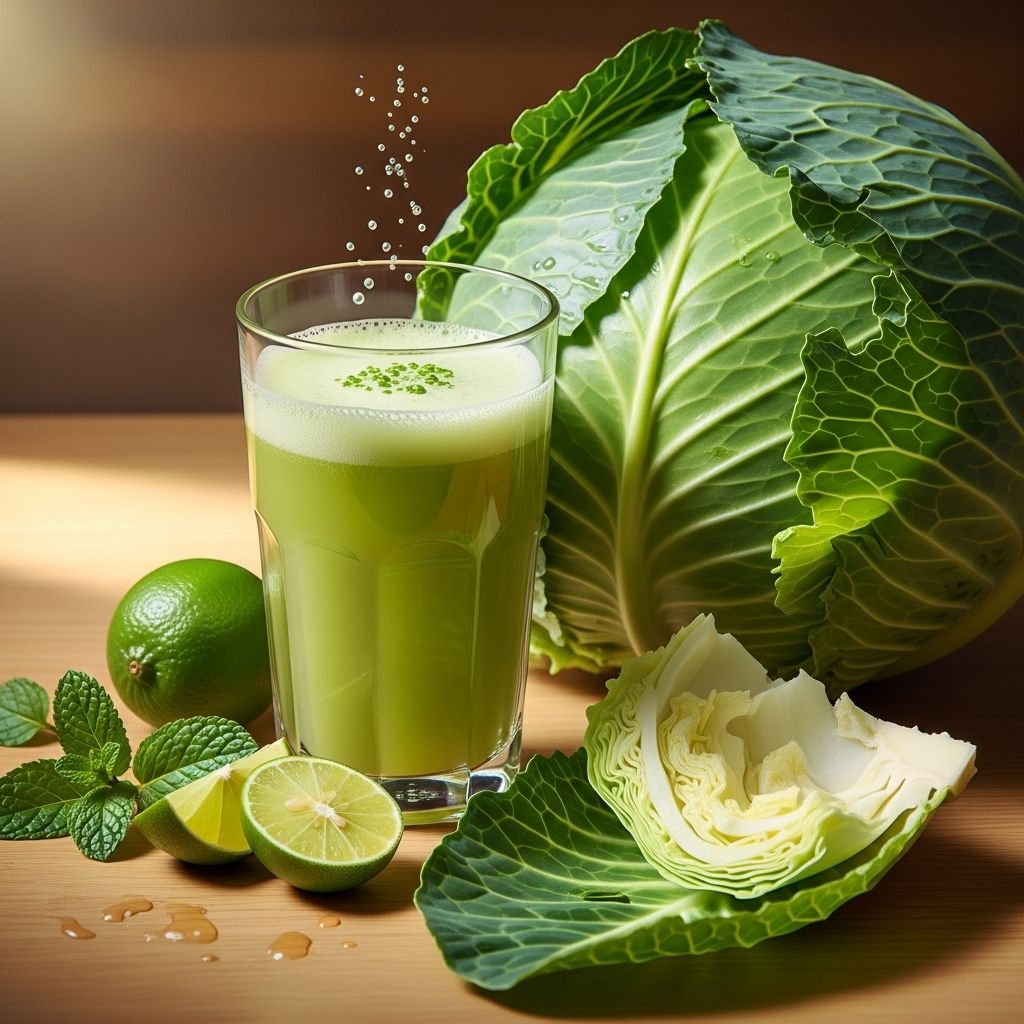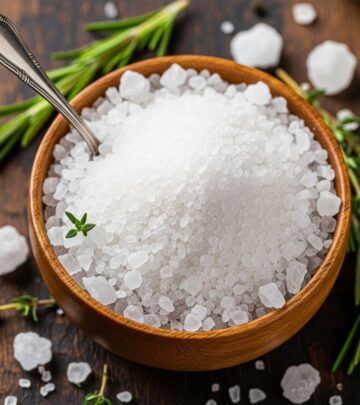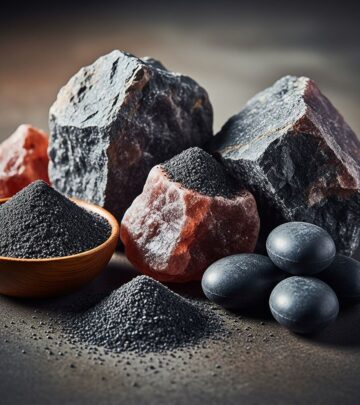12 Science-Backed Health Benefits of Cabbage Juice (And How to Use It)
A gentle daily blend that supports digestion, immune resilience, and sustainable wellness.

Cabbage juice has gained fame as a natural health tonic, offering a refreshing way to harness the power of this leafy cruciferous vegetable. Long used in traditional remedies, modern science now validates many of its claimed benefits. Rich in vitamins, antioxidants, and plant compounds, cabbage juice may benefit your digestive system, immune defenses, heart health, and more. Here, we break down the evidence, explain how cabbage juice works, and offer practical tips for safe, effective use.
What Is Cabbage Juice?
Cabbage juice is made by blending or juicing fresh cabbage leaves, typically using a juicer or high-powered blender. You can use green cabbage, red cabbage, or a mix of both. Red cabbage has higher levels of anthocyanins, giving it added antioxidant potential.
Cabbage juice has a strong, slightly bitter taste and is typically consumed alone, mixed with other vegetable juices, or flavored with herbs and lemon.
Nutritional Profile of Cabbage Juice
- Low in calories (about 22 per cup)
- Rich in vitamin C: Boosts immunity and acts as a powerful antioxidant
- Vitamin K: Important for bone health and blood clotting
- Vitamin U (S-methylmethionine): May help protect the stomach lining
- Antioxidants: Polyphenols, anthocyanins (especially in red cabbage), sulforaphane, kaempferol
- Fiber: Supports digestion
- Minerals: Potassium, calcium, magnesium
1. A Potent Source of Antioxidants
Cabbage juice is packed with antioxidants, including vitamin C, anthocyanins (especially in red cabbage), sulforaphane, and flavonoids. These compounds neutralize free radicals, which can protect cells from oxidative damage and lower the risk of chronic diseases like cancer and heart disease.
- Red cabbage contains high levels of anthocyanins, the pigments that provide its distinctive color and are linked with cardiovascular and brain health benefits.
- Sulforaphane, also found in broccoli, has anti-cancer properties and can help fight inflammation.
2. Fights Inflammation Naturally
Chronic inflammation is at the root of many health problems. Cabbage juice contains anti-inflammatory plant compounds like sulforaphane and kaempferol.
- Studies suggest that cabbage juice reduces markers of inflammation in laboratory and animal models.
- May help manage symptoms of conditions like inflammatory bowel disease (IBD).
- Topical application of cabbage extract may soothe inflamed skin.
3. Supports Ulcer and Gut Healing
Drinking cabbage juice is an old folk remedy for peptic ulcers, and modern research suggests it may offer real benefits.
- Contains “Vitamin U” (S-Methylmethionine): A unique compound in cabbage juice shown to promote healing of the stomach lining.
- Historically used to treat gastric and duodenal ulcers; may help wounds heal up to four times faster.
- May combat ulcer-causing Helicobacter pylori bacteria by providing antimicrobial and anti-inflammatory effects.
4. Improves Digestion and Gut Health
Cabbage juice contains dietary fiber, prebiotic compounds, and plant bioactives that are especially beneficial for the microbiome.
- Feeds beneficial gut bacteria, enhancing digestive regularity and resilience against digestive disorders.
- Reduces inflammation in the gut and can speed up recovery from colonic damage seen in animal models of IBD.
- May be useful for people with constipation, irritable bowel syndrome (IBS), or those seeking better gut health overall.
5. Boosts Immune Function
Thanks to its high vitamin C and antioxidant content, cabbage juice supports a responsive immune system.
- Vitamin C enhances white blood cell function and helps the body fend off infections.
- Protects immune cells from oxidative stress.
- Some phytochemicals may improve immune regulation, supporting a healthy inflammatory response.
6. May Protect Against Certain Cancers
Cabbage juice and other cruciferous vegetable juices contain sulfur-containing compounds (glucosinolates) with strong anticancer potential.
- Lab and animal studies show these compounds can limit the growth of various cancer cells, including breast, colon, bladder, and liver cancers.
- Population studies link higher cruciferous vegetable intake with lower risk of certain cancers (notably breast and colon).
- Sulforaphane and isothiocyanates can inhibit carcinogens and encourage detoxification pathways.
7. Supports Heart Health
Red cabbage juice is especially heart-healthy due to its high anthocyanin and flavonoid content.
- Anthocyanins can help reduce the risk of heart disease by lowering ‘bad’ LDL cholesterol, blood pressure, and arterial stiffness.
- Vitamin K also supports vascular health and helps with blood clotting.
- Potassium helps regulate blood pressure.
8. Promotes Radiant Skin and Wound Healing
With its blend of vitamin C, antioxidants, and skin-friendly compounds, cabbage juice can help your skin look and feel better.
- Vitamin C is essential for collagen synthesis, wound healing, and protecting skin from sun damage.
- Topically applied cabbage extract has shown benefit for soothing eczema and other inflammatory skin conditions.
- Antioxidants help reduce pigmentation, dryness, and early signs of aging.
9. May Aid in Weight Loss
Cabbage juice is low in calories and high in fiber, a combination that supports healthy weight management.
- Promotes satiety and reduces total calorie intake.
- May help break down body fat thanks to its bioactive plant compounds.
10. Supports Bone and Joint Health
High levels of vitamin K and calcium in cabbage juice are essential for strong bones.
- Vitamin K is crucial for bone metabolism and helps prevent osteoporosis.
- Anti-inflammatory properties may support joint health and ease symptoms of arthritis.
11. Can Help Detoxify the Body
The glucosinolates and antioxidants in cabbage juice help activate the body’s natural detoxification enzymes.
- Supports liver function and excretion of toxins.
- Promotes elimination of harmful chemicals from the body.
12. Promotes Healthy Hair
Cabbage juice’s blend of vitamins and minerals supports healthy hair growth.
- Vitamin C, sulfur, and biotin can strengthen hair and prevent premature greying or hair thinning.
How to Make Cabbage Juice at Home
Preparing cabbage juice is simple, but a few steps help improve taste and nutrient content:
- Wash and roughly chop ½ head of fresh cabbage (any color).
- Optionally add one carrot, half an apple, or a cucumber for flavor.
- Feed into a juicer or blend with 1 cup of water, then strain through a fine mesh sieve.
- Enjoy fresh, ideally in the morning. Start with ½ cup per day, increasing to 1 cup as tolerated.
Tip: Drink immediately after preparation to maximize vitamin and antioxidant content.
Potential Side Effects and Safety Tips
- Digestive discomfort: Large amounts of raw cabbage juice can cause gas or bloating, especially in people not used to high-fiber diets.
- Interaction with thyroid health: Cabbage contains goitrogens, which may impact thyroid function in sensitive individuals if consumed in excess.
- Possible interaction with blood thinners: Due to its vitamin K content, talk with your doctor if you are on anticoagulant therapy.
- Bacterial contamination risk: Always wash and prepare cabbage carefully; wash juicer parts after every use.
Who Should Avoid or Limit Cabbage Juice?
- Individuals with known cabbage or cruciferous vegetable allergy
- Those with thyroid disorders (limit large amounts, especially raw)
- People taking blood-thinning medication (due to high vitamin K)
Most people can safely enjoy cabbage juice as part of a varied diet.
Table: Nutrition Comparison – Red vs. Green Cabbage Juice (per 1 cup)
| Nutrient | Red Cabbage Juice | Green Cabbage Juice |
|---|---|---|
| Calories | 22 | 22 |
| Vitamin C (% DV) | 85 | 55 |
| Vitamin K (% DV) | 42 | 85 |
| Anthocyanins | High | Low |
| Folate (% DV) | 10 | 8 |
| Fiber (g) | 2.2 | 2.0 |
Frequently Asked Questions (FAQ)
Q: How much cabbage juice should I drink per day?
A: Most experts recommend starting with ½ cup (120 ml) per day. Gradually increase to 1 cup (240 ml), observing for any digestive discomfort. Consult your doctor if you have a medical condition.
Q: Is cabbage juice better than eating whole cabbage?
A: Both offer unique benefits. Juicing may make some nutrients more bioavailable and is easier to digest for some. However, whole cabbage provides more fiber. Combining both is ideal.
Q: Can cabbage juice heal ulcers naturally?
A: Scientific studies in the mid-20th century found that cabbage juice helped heal peptic ulcers, likely due to “vitamin U” and antioxidants. However, consult your healthcare provider for diagnosis and treatment if you suspect an ulcer.
Q: Is it safe to drink cabbage juice every day?
A: For most healthy adults, daily consumption in moderation is safe. Avoid excessive intake and monitor for digestive symptoms or signs of allergy.
Q: Can children and pregnant women drink cabbage juice?
A: In small, food-based amounts, cabbage juice is generally safe. However, raw juices are not advised for infants and should be introduced with caution in young children and pregnancy. Always consult a pediatrician or doctor first.
Key Takeaways
- Cabbage juice contains potent antioxidants, vitamins, and plant compounds with scientifically supported health benefits.
- Supports digestive, immune, heart, and skin health.
- May aid in ulcer healing and improving gut microbiome balance.
- Best consumed fresh in moderation as part of a healthy, balanced diet.
References
- Healthline. Cabbage Juice: Uses, Benefits, and Side Effects.
- Apollo247. Benefits of Cabbage Juice for Ulcers.
- MedicineNet. Cabbage Juice: Uses, Benefits, and Side Effects.
- University of Missouri. Can a natural juice help your gut health? (2024).
References
- https://www.healthline.com/nutrition/cabbage-juice
- https://www.apollo247.com/health-topics/ulcers/benefits-of-cabbage-juice-for-ulcers
- https://www.medicinenet.com/cabbage_juice_uses_benefits_and_side_effects/article.htm
- https://showme.missouri.edu/2024/can-a-natural-juice-help-your-gut-health-university-of-missouri-researchers-find-evidence-it-can/
- https://pmc.ncbi.nlm.nih.gov/articles/PMC10778654/
- https://pubmed.ncbi.nlm.nih.gov/34974788/
- https://health.clevelandclinic.org/benefits-of-cabbage
- https://consensus.app/home/blog/benefits-of-cabbage/
- https://www.webmd.com/diet/health-benefits-red-cabbage
Read full bio of Sneha Tete












